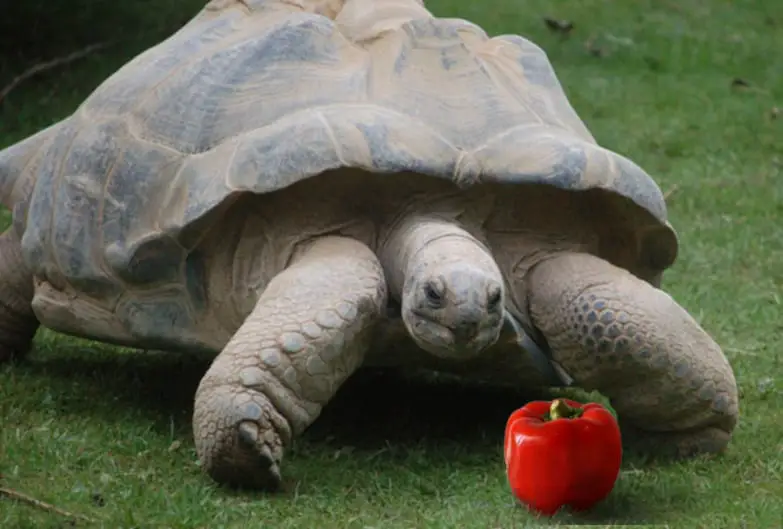
Tortoises can eat bell peppers and have them as a part of a healthy and balanced diet. They are safe to eat and can be a great source of vitamins. They should, however, be offered in moderation.
Tortoises eat a lot of things and, despite every tortoise having its own preferences and possibly being pickier compared to others, they have a very varied diet. A captive tortoise’s diet typically consists of leafy greens, vegetables, fruit, protein, and commercial tortoise food.
However, they cannot eat just anything. While they do eat vegetables, for instance, not every vegetable may be suitable for them. As such, when it comes to bell peppers, you may not know for sure whether they are safe and healthy for your own pet tortoise. Read on to learn a bit more about bell peppers and how good they are for your tortoise.
I should probably say at this point that I have routinely fed my tortoises bell pepper over the years, although I have always considered it more of a ‘treat’ food than anything else, only providing a small portion of it every few weeks.
It is important to note that tropical tortoises such as red and yellow foot tortoises naturally consume more fruit in their diet, and can therefore safely eat a greater quantity of bell pepper than a mediterranean species for example. As such I would be comfortable feeding my tropical tortoise bell pepper several times per week.
What Are Bell Peppers?
Bell pepper, also known as sweet pepper or simply pepper, is a fruit from the nightshade family that is often used as a vegetable ingredient in many dishes. It is part of the Capsicum annuum species and it is very thick. More often than not, it is added to various salads. Sometimes, it is even used in different cooked dishes.
Bell peppers are especially appreciated for the vitamins they pack and for their low caloric content, and what is noticeable is the color variety they have. Bell peppers typically come in orange, yellow, red, or green. The different colored varieties often bring different tastes as well, with green, unripe peppers often having a slightly more bitter flavor compared to the ripe varieties.
Are Bell Peppers Safe for Tortoises?
Considering bell pepper contains a large number of vitamins, it is very safe for tortoises and can be fed to your pet. Some of the vitamins found in bell peppers that are essential for a tortoise’s health include:
- Vitamin A
- Vitamin C
- Vitamin B6
- Vitamin E
- Vitamin K1
- Potassium
It’s important to note that whereas the fruit can be offered to tortoises in moderation and has no toxicity, the roots, stem, and leaves are toxic. Therefore, you should never feed them to your pet.
Also, while the peppers make a great addition to a varied tortoise diet, they should never be offered to the pet in excess, particularly when it comes to ripened pepper. This is because sweet pepper contains a lot of sugar, which can be harmful to a tortoise in the long term.
Anything too high in sugar should only be less than 20% of a tortoise’s diet. The ideal tortoise diet should consist of fresh veggies and weeds in a proportion of 80%. A lot of them love to eat things like dandelions, collard greens, and kale. But it’s also true that they also love bell peppers in some cases, although these should be offered in small quantities only.
Think of it as a human eating fast food every single day for every meal. A poor diet will be harmful to your health because you are consuming too much sugar, sodium, and fat content, even though you are eating the right amount of food. Similarly, it is not healthy for the tortoise to consume too much bell pepper.
Being provided with too much sugary produce may make a tortoise addicted to it – thus, it will avoid the healthier and more necessary parts of its diet and consume only what it likes. In time this will lead to nutritional deficiencies as there will insufficient levels of essential nutrients entering the body. Over time, blood flow will be restricted, the animal will have less energy, its heart rate will drop and it will have a harder time recovering from injuries and illnesses.
Keeping the Tortoise Hydrated when Feeding Bell Peppers
Improper diet is a common reason why some tortoises end up with kidney stones. However poor the diet, lack of hydration is also a big accompanying factor in this problem. The good news is that bell peppers have a pretty high-water content, as fresh, raw bell peppers are 92% water. None the less, before offering bell pepper to your tortoise, you should also make sure it has enough fresh water available. This is best practice at all times.
Drinking a lot of water is something that keeps the urine diluted, and it also helps flush out any anti-nutrients. For instance, green peppers (like many other forms of fresh produce) contain oxalate, which is one of the things that increase the risk of developing kidney stones.
Thus, the tortoise will need to not only drink a lot of water but also be soaked regularly.
Should Bell Peppers Be Part of the Tortoise’s Diet?
They certainly can, but there are a few considerations to keep in mind.
Food that contains too much sugar can impair the organ function of a tortoise in the long run – especially when eaten in excess. Basically, when something has too much sugar and starch, it can change the bacteria found in the hindgut of a tortoise, thus disrupting digestion. Besides, considering that green peppers contain oxalates, they can be harmful in excess. There is evidence demonstrating that the gut absorbs fewer minerals when food with too many oxalates is eaten, especially when combined with ingredients higher in fiber.
Bell peppers contain 4.2 grams of sugar, which is a bit high, particularly if fed too often. Variety is extremely important in the diet of a tortoise. After all, in the wild, they find a large variety of plants, and they do not only eat the same thing.
The Bottom Line
As you can see, bell peppers are definitely safe for tortoises, mostly due to how many essential vitamins they contain. But while these are great for keeping the pet healthy, too much bell pepper can be harmful. Keep in mind that it contains a lot of sugar, so it should not become a habit to give the reptile bell peppers. In fact, sugary foods should not make more than 15-20% of the tortoise’s diet, although tropical species can safely consume a little more than this. So long as you offer them in moderation, the tortoise will not develop an addiction to them. This way, it will be able to eat the other necessary foods and get the nutrients it requires.


